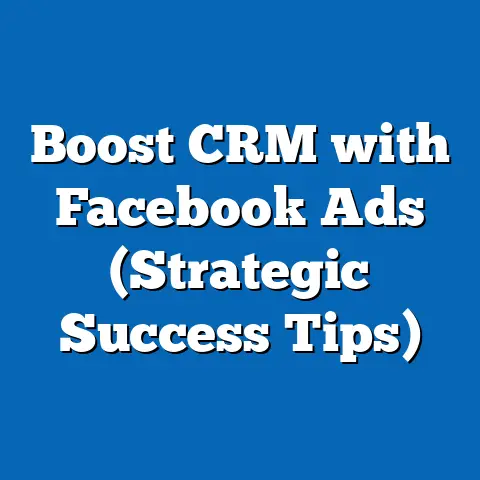Master Special fb ad Categories (Essential for Compliance)
The world is changing, and so is the way we communicate.
As environmental issues become increasingly urgent, our social consciousness evolves, demanding more responsibility from businesses and advertisers alike.
Facebook, being one of the largest advertising platforms globally, has taken note, and their advertising policies reflect this shift.
Understanding and adhering to these policies, especially when it comes to climate-related messaging, is no longer optional; it’s essential for successful and ethical advertising.
I’ve spent years navigating the complexities of Facebook Ads, witnessing firsthand how crucial compliance is to long-term success.
I remember one campaign I ran for a sustainable energy company.
We were so focused on highlighting the environmental benefits that we inadvertently used language that could be interpreted as making unsubstantiated health claims.
The ad was flagged, and we had to scramble to revise our messaging.
This experience taught me the importance of understanding the nuances of Facebook’s special ad categories.
Here’s what you can expect to learn:
- Understanding Facebook’s Ad Categories: Learn the fundamentals of Facebook’s ad policies and why compliance is critical.
- Navigating the Special Ad Categories: Deep dives into Housing, Employment, Credit, Social Issues, and Health, with a focus on climate-related applications.
- Real-World Examples and Case Studies: See how successful campaigns have navigated these categories while promoting sustainability and environmental awareness.
- Common Pitfalls and How to Avoid Them: Learn from my mistakes and those of others, avoiding costly compliance errors.
- Actionable Insights and Best Practices: Equip yourself with the knowledge and tools to create effective and compliant Facebook ads.
Let’s embark on this journey together, ensuring your climate-related advertising not only reaches the right audience but also contributes to a more responsible and sustainable future.
Section 1: Understanding Facebook’s Ad Categories
Facebook’s advertising platform is a powerful tool, capable of reaching billions of people worldwide.
However, with this power comes responsibility.
To ensure a safe and equitable environment for its users, Facebook has established a comprehensive set of advertising policies that govern the types of content that can be promoted on the platform.
Understanding these ad categories is the first step towards creating effective and compliant campaigns.
It’s not just about following the rules; it’s about respecting your audience and building trust.
I’ve seen countless campaigns fail, not because of poor targeting or uninspired creative, but because they violated Facebook’s advertising policies.
The Importance of Compliance
Compliance with Facebook’s advertising policies is not optional.
It’s a fundamental requirement for running ads on the platform.
Failure to comply can result in ad disapproval, account suspension, or even permanent banishment from the platform.
Beyond the immediate consequences, non-compliance can also damage your brand’s reputation and erode trust with your audience.
Think of it like this: Facebook is a community, and its advertising policies are the community guidelines.
Just as you wouldn’t want to violate the rules of your local community, you shouldn’t violate the rules of the Facebook community.
Rationale Behind Special Ad Categories
Special ad categories are a subset of Facebook’s advertising policies designed to protect vulnerable populations and ensure ethical advertising practices in sensitive areas.
These categories address issues where discrimination and bias have historically been prevalent, such as housing, employment, and credit.
The rationale behind these categories is to prevent advertisers from using Facebook’s targeting capabilities to exclude certain groups of people from seeing ads related to these sensitive topics.
For example, an advertiser cannot target a housing ad specifically to people of a certain race or exclude people based on their gender.
I remember when these special ad categories were first introduced.
There was a lot of initial confusion and frustration from advertisers, including myself.
However, as I learned more about the underlying rationale and the importance of preventing discrimination, I came to appreciate the need for these policies.
The Five Main Special Ad Categories
Facebook currently has five main special ad categories:
- Housing: Ads for real estate listings, homeowners insurance, mortgage loans, and other housing-related opportunities.
- Employment: Ads for job opportunities, internships, professional certifications, and other employment-related services.
- Credit: Ads for credit cards, auto loans, personal loans, and other credit-related offers.
- Social Issues, Elections or Politics: Ads that discuss or advocate for a position on a sensitive public issue, election, or political figure.
- Health: Ads for healthcare products, services, or procedures.
While these categories may seem straightforward, their application can be nuanced.
And in the context of climate change, the lines can become even blurrier.
For example, an ad promoting energy-efficient appliances could fall under both the Housing and Social Issues categories.
Takeaway: Understanding Facebook’s ad categories is crucial for creating compliant and effective campaigns.
Special ad categories are designed to protect vulnerable populations and ensure ethical advertising practices.
Section 2: The Housing Category
The Housing special ad category is one of the most heavily regulated areas of Facebook advertising.
This category aims to prevent discrimination in housing opportunities, ensuring that everyone has equal access to information about available properties, loans, and insurance.
As someone who has worked with real estate clients for years, I’ve seen firsthand the challenges of navigating these regulations.
It requires a careful understanding of the rules and a commitment to ethical advertising practices.
Compliance Requirements in the Housing Category
When running ads in the Housing special ad category, you are subject to several restrictions:
- Limited Targeting Options: You cannot target ads based on age, gender, zip code, or any other demographic characteristic that could be used to discriminate against certain groups of people.
- No Exclusionary Targeting: You cannot exclude people from seeing your ads based on race, ethnicity, national origin, religion, sex, sexual orientation, familial status, disability, or any other protected characteristic.
- Equal Opportunity Statements: Your ads must include an equal opportunity statement that affirms your commitment to fair housing practices.
These restrictions can make it challenging to reach your target audience effectively.
However, with creativity and strategic planning, it’s possible to create compliant and successful housing ads.
Integrating Climate Considerations into Housing Ads
While the Housing special ad category primarily focuses on preventing discrimination, it also provides an opportunity to promote sustainable living and eco-friendly housing options.
You can highlight features like:
- Energy-efficient appliances: Promote homes with Energy Star-certified appliances that reduce energy consumption.
- Solar panels: Showcase properties with solar panels that generate clean energy and lower electricity bills.
- Green building materials: Highlight homes built with sustainable and environmentally friendly materials.
- Water conservation features: Promote properties with water-saving fixtures and landscaping practices.
By focusing on these climate-friendly aspects, you can attract environmentally conscious buyers and renters while staying compliant with Facebook’s advertising policies.
Case Studies: Successful Climate-Focused Housing Ads
I’ve seen some great examples of housing ads that successfully integrate climate considerations while adhering to Facebook’s special ad category restrictions.
Here’s one that sticks out:
- A real estate company in California ran a campaign promoting “net-zero” homes.
Their ads highlighted the energy efficiency and sustainability of these properties, emphasizing the long-term cost savings and environmental benefits.
They used broad targeting based on location and interests related to sustainable living, avoiding any demographic targeting that could be considered discriminatory.
The campaign resulted in a significant increase in inquiries and sales for their net-zero homes.
This example demonstrates that it’s possible to promote climate-friendly housing options effectively while staying compliant with Facebook’s advertising policies.
Common Pitfalls and How to Avoid Them
One of the most common pitfalls in the Housing special ad category is using language or imagery that could be interpreted as discriminatory.
For example, using phrases like “family-friendly neighborhood” or “close to good schools” could be seen as excluding certain groups of people.
To avoid these pitfalls, I recommend:
- Reviewing your ad copy and imagery carefully: Ensure that your ads are inclusive and do not convey any discriminatory messages.
- Using broad targeting: Focus on location and interests related to sustainable living, rather than demographic characteristics.
- Consulting with a legal expert: If you’re unsure about whether your ads comply with Facebook’s policies, seek legal advice.
Takeaway: The Housing special ad category requires careful attention to compliance.
By focusing on climate-friendly features and using broad targeting, you can create effective and ethical housing ads.
Section 3: The Employment Category
The Employment special ad category aims to prevent discrimination in job opportunities.
It ensures that everyone has equal access to information about available positions, internships, and professional certifications, regardless of their background.
As the green economy grows, there’s an increasing demand for professionals in renewable energy, sustainable agriculture, and other eco-friendly industries.
This presents a unique opportunity for advertisers to promote these roles while staying compliant with Facebook’s advertising policies.
Compliance Requirements in the Employment Category
Similar to the Housing category, the Employment special ad category has several restrictions:
- Limited Targeting Options: You cannot target ads based on age, gender, zip code, or any other demographic characteristic that could be used to discriminate against certain groups of people.
- No Exclusionary Targeting: You cannot exclude people from seeing your ads based on race, ethnicity, national origin, religion, sex, sexual orientation, familial status, disability, or any other protected characteristic.
- Equal Opportunity Employer Statements: Your ads must include an equal opportunity employer statement that affirms your commitment to fair hiring practices.
These restrictions can make it challenging to reach qualified candidates.
However, by focusing on skills, experience, and interests, you can create effective and compliant employment ads.
Promoting Green Jobs and Sustainable Business Practices
The rise of green jobs presents a significant opportunity for advertisers to promote sustainable business practices and attract environmentally conscious talent.
You can highlight:
- Renewable energy positions: Promote jobs in solar, wind, and other renewable energy industries.
- Sustainable agriculture roles: Showcase positions in organic farming, permaculture, and other sustainable agriculture practices.
- Environmental consulting jobs: Highlight opportunities in environmental consulting firms that help businesses reduce their environmental impact.
- Sustainability management positions: Promote roles focused on developing and implementing sustainability strategies within organizations.
By focusing on these green job opportunities, you can attract candidates who are passionate about sustainability and committed to making a positive impact on the environment.
Examples of Successful Climate Action Initiatives in Employment Ads
I’ve seen some inspiring employment ads that successfully highlight climate action initiatives while adhering to Facebook’s special ad category restrictions.
Here’s a memorable one:
- A solar energy company ran a campaign promoting job openings for solar panel installers.
Their ads emphasized the company’s commitment to sustainability and its mission to provide clean, affordable energy to communities.
They used broad targeting based on location and interests related to renewable energy, avoiding any demographic targeting that could be considered discriminatory.
The campaign attracted a large pool of qualified candidates who were passionate about solar energy.
This example demonstrates that it’s possible to promote green job opportunities effectively while staying compliant with Facebook’s advertising policies.
Potential Challenges and Compliance Issues
One of the potential challenges in the Employment special ad category is ensuring that your job descriptions are inclusive and do not contain any language that could be interpreted as discriminatory.
For example, using phrases like “recent college graduate” or “energetic team player” could be seen as excluding certain groups of people.
To avoid these challenges, I recommend:
- Reviewing your job descriptions carefully: Ensure that your job descriptions are inclusive and do not convey any discriminatory messages.
- Focusing on skills and experience: Emphasize the skills and experience required for the job, rather than demographic characteristics.
- Using broad targeting: Focus on location and interests related to the job, rather than demographic characteristics.
Takeaway: The Employment special ad category requires careful attention to compliance.
By focusing on green job opportunities and using broad targeting, you can create effective and ethical employment ads.
Section 4: The Credit Category
The Credit special ad category is designed to prevent discrimination in access to financial products and services.
It ensures that everyone has an equal opportunity to obtain credit cards, loans, and other financial instruments, regardless of their background.
In the context of climate change, this category is particularly relevant for promoting financial products that support climate initiatives, such as green loans, sustainable investments, and energy-efficient mortgages.
Compliance Requirements for Financial Products Supporting Climate Initiatives
When running ads in the Credit special ad category, you are subject to several restrictions:
- Limited Targeting Options: You cannot target ads based on age, gender, zip code, or any other demographic characteristic that could be used to discriminate against certain groups of people.
- No Exclusionary Targeting: You cannot exclude people from seeing your ads based on race, ethnicity, national origin, religion, sex, sexual orientation, familial status, disability, or any other protected characteristic.
- Clear and Accurate Disclosures: Your ads must include clear and accurate disclosures about the terms and conditions of the financial product being advertised.
These restrictions can make it challenging to reach your target audience effectively.
However, with creativity and strategic planning, it’s possible to create compliant and successful credit ads that promote climate initiatives.
Effectively Marketing Climate-Friendly Financial Products
To effectively market climate-friendly financial products while adhering to Facebook’s policies, you can:
- Highlight the environmental benefits: Emphasize the positive impact of the financial product on the environment.
For example, you could highlight the reduction in carbon emissions or the support for renewable energy projects. - Focus on the financial incentives: Showcase the financial benefits of the product, such as lower interest rates or tax credits for energy-efficient upgrades.
- Use compelling visuals: Use images and videos that showcase the positive impact of the product on the environment and the community.
By focusing on these aspects, you can attract environmentally conscious consumers who are looking for financial products that align with their values.
Examples of Credit-Related Campaigns Promoting Environmentally Responsible Practices
I’ve come across some innovative credit-related campaigns that successfully promote environmentally responsible practices while staying compliant with Facebook’s special ad category restrictions.
Here’s one that stands out:
- A credit union ran a campaign promoting “green loans” for energy-efficient home improvements.
Their ads highlighted the low interest rates and the environmental benefits of these loans, emphasizing the reduction in energy consumption and carbon emissions.
They used broad targeting based on location and interests related to sustainable living, avoiding any demographic targeting that could be considered discriminatory.
The campaign resulted in a significant increase in applications for their green loans.
This example demonstrates that it’s possible to promote climate-friendly financial products effectively while staying compliant with Facebook’s advertising policies.
Common Compliance Mistakes and How to Avoid Them
One of the most common compliance mistakes in the Credit special ad category is failing to provide clear and accurate disclosures about the terms and conditions of the financial product being advertised.
This can lead to consumer confusion and potential legal issues.
To avoid these mistakes, I recommend:
- Reviewing your ad copy and disclosures carefully: Ensure that your ads include all required disclosures in a clear and easy-to-understand format.
- Consulting with a legal expert: If you’re unsure about whether your ads comply with Facebook’s policies, seek legal advice.
- Staying up-to-date on the latest regulations: Facebook’s advertising policies are constantly evolving, so it’s important to stay informed about the latest changes.
Takeaway: The Credit special ad category requires careful attention to compliance.
By highlighting the environmental benefits of climate-friendly financial products and providing clear disclosures, you can create effective and ethical credit ads.
Section 5: The Social Issues Category
The Social Issues, Elections or Politics special ad category is designed to ensure transparency and fairness in advertising related to sensitive public issues, elections, and political figures.
This category is particularly relevant in the context of climate change, as it often involves advocating for specific policies, raising awareness about environmental challenges, and promoting sustainable practices.
As climate change is increasingly recognized as a pressing social issue, understanding how to navigate this category is crucial for organizations and individuals seeking to raise awareness and advocate for change on Facebook.
How Climate Change is Classified as a Social Issue
Facebook defines social issues as topics that are widely debated and have a significant impact on society.
Climate change clearly falls into this category, as it is a subject of intense debate and has far-reaching consequences for the environment, the economy, and public health.
This means that any ad that discusses or advocates for a position on climate change, whether it’s promoting renewable energy, advocating for carbon emissions reductions, or raising awareness about the impacts of climate change, is subject to the requirements of the Social Issues special ad category.
The Role of Advocacy and Awareness Campaigns
Advocacy and awareness campaigns play a crucial role in shaping public opinion and driving action on climate change.
These campaigns can use Facebook ads to:
- Raise awareness about the impacts of climate change: Educate the public about the consequences of climate change, such as rising sea levels, extreme weather events, and food shortages.
- Advocate for specific policies: Support policies that promote renewable energy, reduce carbon emissions, and protect the environment.
- Promote sustainable practices: Encourage individuals and businesses to adopt sustainable practices, such as reducing their carbon footprint, conserving water, and using renewable energy.
By using Facebook ads effectively, advocacy and awareness campaigns can reach a large audience and inspire action on climate change.
Case Studies: Impactful Social Issue Ads Addressing Climate-Related Challenges
I’ve seen some powerful social issue ads that have successfully navigated compliance while addressing climate-related challenges.
Here’s one that stands out:
- An environmental organization ran a campaign raising awareness about the impacts of climate change on coastal communities.
Their ads featured stunning visuals of coastal erosion and rising sea levels, along with personal stories from people whose lives have been affected by climate change.
They used broad targeting based on location and interests related to environmental issues, avoiding any demographic targeting that could be considered discriminatory.
The campaign generated a significant increase in donations and volunteer sign-ups for the organization.
This example demonstrates that it’s possible to create impactful social issue ads that address climate-related challenges while staying compliant with Facebook’s advertising policies.
Compliance Challenges Specific to Social Issue Advertising
One of the biggest compliance challenges in the Social Issues special ad category is ensuring that your ads are transparent and do not contain any misleading or deceptive information.
This is particularly important when discussing complex scientific topics like climate change.
To overcome these challenges, I recommend:
- Fact-checking your ad copy and visuals carefully: Ensure that all information in your ads is accurate and supported by credible sources.
- Being transparent about your organization’s mission and goals: Clearly state your organization’s mission and goals in your ads and on your website.
- Avoiding sensationalism or fear-mongering: Focus on presenting accurate information in a calm and rational manner.
Takeaway: The Social Issues special ad category is crucial for raising awareness and advocating for change on climate change.
By being transparent and avoiding misleading information, you can create effective and ethical social issue ads.
Section 6: The Health Category
The Health special ad category is designed to protect consumers from misleading or harmful health-related advertising.
This category is particularly relevant in the context of climate change, as environmental factors can have a significant impact on public health.
For instance, air quality, access to clean water, and the spread of vector-borne diseases are all influenced by climate change.
As advertisers, it’s our responsibility to ensure that our ads do not make false or unsubstantiated health claims and that they comply with Facebook’s advertising policies.
Compliance Requirements Related to Public Health and Climate Change
When running ads in the Health special ad category, you are subject to several restrictions:
- No False or Misleading Claims: You cannot make false or misleading claims about the health benefits of your product or service.
- Substantiation of Claims: You must be able to substantiate any health claims you make with credible scientific evidence.
- Compliance with Regulations: You must comply with all applicable laws and regulations related to health advertising.
These restrictions can make it challenging to promote health-related products and services effectively.
However, by focusing on accurate information and avoiding unsubstantiated claims, you can create compliant and successful health ads that address climate impacts.
Promoting Health-Related Products or Services Addressing Climate Impacts
To promote health-related products or services that address climate impacts while maintaining compliance, you can:
- Focus on the benefits of clean air and water: Highlight the health benefits of air purifiers, water filters, and other products that improve air and water quality.
- Promote products that protect against vector-borne diseases: Showcase products that protect against mosquito bites, tick bites, and other vector-borne diseases that are becoming more prevalent due to climate change.
- Highlight the benefits of healthy lifestyles: Encourage people to adopt healthy lifestyles, such as eating a balanced diet, exercising regularly, and spending time in nature, which can help them cope with the stress and anxiety associated with climate change.
By focusing on these aspects, you can attract health-conscious consumers who are looking for products and services that can help them protect their health in the face of climate change.
Examples of Successful Health Campaigns Intersecting with Climate Action
I’ve seen some excellent health campaigns that successfully intersect with climate action while staying compliant with Facebook’s special ad category restrictions.
Here’s one that I particularly admire:
- A company selling air purifiers ran a campaign highlighting the health benefits of clean air in urban areas with high levels of air pollution.
Their ads featured images of people breathing freely in clean air, along with information about the health risks of air pollution.
They used broad targeting based on location and interests related to health and environmental issues, avoiding any demographic targeting that could be considered discriminatory.
The campaign resulted in a significant increase in sales for their air purifiers.
This example demonstrates that it’s possible to promote health-related products effectively while staying compliant with Facebook’s advertising policies and addressing climate-related health concerns.
Common Pitfalls and Solutions for Compliance
One of the most common pitfalls in the Health special ad category is making unsubstantiated health claims.
For example, claiming that a product can cure a disease or prevent a health condition without credible scientific evidence is a violation of Facebook’s advertising policies.
To avoid these pitfalls, I recommend:
- Consulting with a medical expert: If you’re unsure about whether your health claims are accurate and substantiated, seek advice from a qualified medical professional.
- Reviewing your ad copy and visuals carefully: Ensure that your ads do not contain any false or misleading information.
- Staying up-to-date on the latest regulations: Facebook’s advertising policies are constantly evolving, so it’s important to stay informed about the latest changes.
Takeaway: The Health special ad category requires careful attention to compliance.
By focusing on accurate information and avoiding unsubstantiated claims, you can create effective and ethical health ads that address climate impacts.
Conclusion
Mastering Facebook’s special ad categories is not just about avoiding penalties; it’s about embracing ethical advertising practices and contributing to a more responsible and sustainable future.
As we’ve explored in this article, each category – Housing, Employment, Credit, Social Issues, and Health – presents unique challenges and opportunities for advertisers seeking to promote climate-related messages.
From showcasing sustainable living options in the Housing category to promoting green jobs in the Employment category, we’ve seen how advertisers can effectively integrate climate considerations into their campaigns while adhering to Facebook’s policies.
We’ve also discussed the importance of transparency and accuracy in the Social Issues and Health categories, ensuring that our ads are informative and do not mislead consumers.
The broader implications of ethical advertising in the context of climate change are significant.
As advertisers, we have a responsibility to use our platforms to raise awareness, promote sustainable practices, and advocate for policies that protect the environment and public health.
By mastering Facebook’s special ad categories, we can ensure that our advertising efforts contribute positively to societal issues.
Remember, the landscape of climate-specific advertising is constantly evolving, and Facebook’s policies are subject to change.
It’s crucial to stay informed about the latest updates and continue educating yourself on compliance.
This article is just a starting point.
I encourage you to delve deeper into Facebook’s advertising policies, consult with legal experts, and seek advice from experienced marketers.
As I continue my journey in the ever-changing world of Facebook ads, I hope this has been a helpful guide.
I believe that by working together, we can create a more sustainable and equitable future through ethical and responsible advertising.






